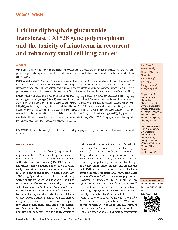摘要
Objective: The aim was to investigate the association between uridine diphosphate glucuronide transferase 1A1 (UGT1A1) gene promoter region polymorphism and irinotecan-related adverse effects and efficacy on recurrent and refractory small cell lung cancer (SCLC). Materials and Methods: A total of 31 patients with recurrent and refractory SCLC were enrolled in this study from June 2012 to August 2013 and received at least two cycles of single-agent irinotecan chemotherapy. The efficacy and adverse effects of irinotecan were evaluated. DNA was extracted from peripheral blood and direct sequencing method was employed to test UGT1A1*28 polymorphism, thus analyzing the correlation between UGT1A1*28 polymorphism and irinotecan-related side-effects and efficacy. Results: A total of 25 cases (80.6%) were UGT1A1*28 wild-type (TA)(6)/(TA)(6); 6 cases (19.4%) were heterozygous mutant (TA)(6)/(TA)(7), no homozygous mutant genotype (TA)(7)/(TA)(7) was found. The incidences of grade 3/4 neutropenia, diarrhea and thrombocytopenia were 35.5%, 25.8% and 22.6% in all the patients, respectively. The incidence of 3/4 adverse effects in patients with genotype (TA)(6)/(TA)(6) and heterozygous (TA)(6)/(TA)(7) had no statistical difference (P> 0.05 for all). The overall response rate (OAR) was 32.3%. Median progression free survival (PFS) and overall survival (OS) were 4 months and 7.5 months in all patients, respectively. There was no statistical difference in OAR, PFS and OS between genotype (TA)(6)/(TA)(6) patients and heterozygous (TA)(6)/(TA)(7) patients. Conclusion: Irinotecan showed efficacy in patients with recurrent and refractory SCLC; UGT1A1 *28 polymorphism failed to predict the incidence of serious adverse effects and efficacy of irinotecan.
- 出版日期2014-11
- 单位浙江省肿瘤医院; 武汉大学
